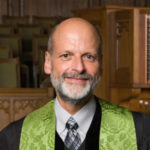
Dear friends,
You’re probably familiar with the story of Moses and the burning bush. Moses saw a strange sight while he was out keeping watch over his father-in-law’s sheep — a bush burning, yet not consumed. Out of the bush came a voice — the voice of God — that would call Moses to go back to Egypt and set his people free from slavery. Moses heard these words: “Take off your shoes, Moses, you’re standing on Holy Ground.”
As this passage of scripture comes up again in the three-year Revised Common Lectionary that we share with many other denominations, I find myself asking again about the notion of “holy ground.” What made that particular ground holy? Was it the presence of a strange burning bush?
The word holy really just means “different,” “other than,” or “set apart for a special purpose.” What made the ground on which Moses stood “different?” It seems that what made the ground holy, different, or set apart is that Moses experienced God in that place.
What might that mean for us today? Would you recognize holy ground if you were standing on it? I think that holy ground is anywhere that we experience God — or where we experience God’s call in our lives. It’s very unlikely that our experience would be at all like Moses. In fact, just in the pages of the Bible, we find a lot of call stories, and no two are alike.
So, how do you recognize holy ground? Holy ground is often found in the very ordinary and mundane course of our lives. When Moses encounters God, it’s an ordinary day, and he’s doing his ordinary job. It’s in his ordinary daily routine that Moses has this extraordinary experience. He’s going about his mundane business as a shepherd when he finds himself standing on Holy Ground.
This story, then, is not so much about the burning bush as it is about Moses opening himself to God’s call. When we are open to the possibility of experiencing God’s presence, the still small voice of calling, or the nudge that pushes us to act, then we can find ourselves — sometimes in surprising ways — standing on Holy Ground. And that is most often in the ordinary moments and places of our lives — whenever and wherever God has our attention long enough for us to be focused on the most important things in life.
I think we find ourselves on holy ground during all the significant moments in our life: the birth of a child, when a child leaves home, during all the natural transitions and turning points in our life — those times when we’re really aware and thinking deeply about what’s most important.
When we listen deeply for God’s call, we can find what Theologian Fred Buechner calls our “vocation,” which he defines as “the place where our deep gladness meets the world’s deep need.” That place is Holy Ground.
Sometimes Holy Ground can be a place where we wrestle with God — where we try to understand better what we are to do. It is the place where we question the authenticity of our calling. Sometimes Holy Ground is where we get a new outlook or discover a new viewpoint that helps us see more clearly what we are being called to do.
Holy Ground is any place where we experience God: where we learn that we’re not alone and where we discover that God provides us with what we need to be who we’re being called to be and what we’re being called to do. It is the place where God challenges us. And Holy Ground is a place of new beginnings.
When in your own life have you found yourself on Holy Ground? Where were you and what prompted this realization? What was God calling you to do — and how did you answer that call?
I look forward to exploring these ideas further with you this Sunday in Sanctuary worship — livestreamed at 11:00.
Grace and Peace,
![]()
Dr. Tim Bruster
Senior Pastor
Exodus 3:1-15 Common English Bible (CEB)
1 Moses was taking care of the flock for his father-in-law Jethro, Midian’s priest. He led his flock out to the edge of the desert, and he came to God’s mountain called Horeb. 2 The Lord’s messenger appeared to him in a flame of fire in the middle of a bush. Moses saw that the bush was in flames, but it didn’t burn up. 3 Then Moses said to himself, Let me check out this amazing sight and find out why the bush isn’t burning up.
4 When the Lord saw that he was coming to look, God called to him out of the bush, “Moses, Moses!”
Moses said, “I’m here.”
5 Then the Lord said, “Don’t come any closer! Take off your sandals, because you are standing on holy ground.” 6 He continued, “I am the God of your father, Abraham’s God, Isaac’s God, and Jacob’s God.” Moses hid his face because he was afraid to look at God.
7 Then the Lord said, “I’ve clearly seen my people oppressed in Egypt. I’ve heard their cry of injustice because of their slave masters. I know about their pain. 8 I’ve come down to rescue them from the Egyptians in order to take them out of that land and bring them to a good and broad land, a land that’s full of milk and honey, a place where the Canaanites, the Hittites, the Amorites, the Perizzites, the Hivites, and the Jebusites all live. 9 Now the Israelites’ cries of injustice have reached me. I’ve seen just how much the Egyptians have oppressed them. 10 So get going. I’m sending you to Pharaoh to bring my people, the Israelites, out of Egypt.”
11 But Moses said to God, “Who am I to go to Pharaoh and to bring the Israelites out of Egypt?”
12 God said, “I’ll be with you. And this will show you that I’m the one who sent you. After you bring the people out of Egypt, you will come back here and worship God on this mountain.”
13 But Moses said to God, “If I now come to the Israelites and say to them, ‘The God of your ancestors has sent me to you,’ they are going to ask me, ‘What’s this God’s name?’ What am I supposed to say to them?”
14 God said to Moses, “I Am Who I Am. So say to the Israelites, ‘I Am has sent me to you.’” 15 God continued, “Say to the Israelites, ‘The Lord, the God of your ancestors, Abraham’s God, Isaac’s God, and Jacob’s God, has sent me to you.’ This is my name forever; this is how all generations will remember me.

